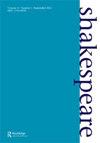现在的天堂:莎士比亚花园和早期现代园艺书籍中渴望的英国伊甸园
IF 0.2
3区 文学
0 LITERATURE, BRITISH ISLES
引用次数: 0
摘要
摘要本文认为莎士比亚将天堂准确地定位在此时此地。在这方面,他的演讲者的语言类似于最近进行了大量研究的园艺书籍和畜牧手册。伊甸园不是一个失落的理想或传统的平凡,而是一个当下欲望的对象,一个可能实现的对象。然而,剧中欲望的语言也是征服的语言。天堂近在咫尺,但它属于别人。在像《理查二世》和《暴风雨》这样截然不同的戏剧中,天堂花园被重新构想和重新部署,以达到手头角色的目的。这种对天堂概念的转变,以满足当地环境和满足当前需求,呼应了当代园艺出版物中伊甸园的民族主义话语。在实际的指示背后,隐藏着戏剧人物共同的梦想:寻找并声称拥有近在咫尺的天堂。有时,这些书似乎和任何一位英国王位继承人一样雄心勃勃;在其他方面,他们承认自己在天气、气候和财富方面所面临的物质限制。这种对天堂的独特关注背后是一种威胁,即如此获得的伊甸园可能不再是伊甸园。本文章由计算机程序翻译,如有差异,请以英文原文为准。
Paradise Now: Desiring English Eden in Shakespearean Gardens and Early Modern Horticultural Books
ABSTRACT This essay contends that Shakespeare locates paradise squarely in the here and now. In this, his speakers’ language resembles that of the garden books and husbandry manuals that have engaged a number of recent studies. Rather than a lost ideal or a conventional commonplace, Eden is an object of present desire, an object that is potentially attainable. However, the plays’ language of desire is also the language of conquest. Paradise is nigh, but it belongs to someone else. In plays as disparate as Richard II and The Tempest, the paradisal garden is reimagined and redeployed for the purposes of the characters at hand. Such transformations of the idea of paradise to meet local circumstances and serve present needs echo nationalist discourses of Eden found in contemporary horticultural publications. Behind the practical instructions lie dreams shared by the dramatic characters: to seek and claim paradise close at hand. Sometimes the books seem as ambitious as any claimant to the English throne; at others they acknowledge the material limitations they face at the hands of weather, climate, and fortune. Underlying this singular focus on paradise is the threat that an Eden so obtained may no longer be Edenic.
求助全文
通过发布文献求助,成功后即可免费获取论文全文。
去求助
来源期刊

Shakespeare
Multiple-
CiteScore
0.30
自引率
33.30%
发文量
37
期刊介绍:
Shakespeare is a major peer-reviewed journal, publishing articles drawn from the best of current international scholarship on the most recent developments in Shakespearean criticism. Its principal aim is to bridge the gap between the disciplines of Shakespeare in Performance Studies and Shakespeare in English Literature and Language. The journal builds on the existing aim of the British Shakespeare Association, to exploit the synergies between academics and performers of Shakespeare.
 求助内容:
求助内容: 应助结果提醒方式:
应助结果提醒方式:


